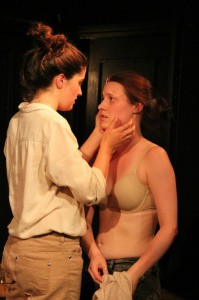 For more than 25 years, Dave Willetts has been a leading musical theatre star and critically acclaimed for his performances in some of the world’s most popular shows. He was the first actor in the world to play the leading roles in both Les Misérables (London and Australia) and The Phantom of the Opera (London and Manchester) and over the years has taken numerous other roles in shows such as Jesus Christ Superstar (Jesus), Sweeney Todd (Sweeney), Sunday in the Park with George (George), Ragtime (Father), Seven Brides for Seven Brothers (Adam Pontipee), South Pacific (Emile de Becque), Sunset Boulevard (Max Von Mayerling – for which he received an Olivier nomination), 42nd Street (Julian Marsh), Aspects of Love (George Dillingham) and Legally Blonde (Professor Callaghan). Dave has also recorded five solo albums and undertaken numerous concert tours of the UK.
For more than 25 years, Dave Willetts has been a leading musical theatre star and critically acclaimed for his performances in some of the world’s most popular shows. He was the first actor in the world to play the leading roles in both Les Misérables (London and Australia) and The Phantom of the Opera (London and Manchester) and over the years has taken numerous other roles in shows such as Jesus Christ Superstar (Jesus), Sweeney Todd (Sweeney), Sunday in the Park with George (George), Ragtime (Father), Seven Brides for Seven Brothers (Adam Pontipee), South Pacific (Emile de Becque), Sunset Boulevard (Max Von Mayerling – for which he received an Olivier nomination), 42nd Street (Julian Marsh), Aspects of Love (George Dillingham) and Legally Blonde (Professor Callaghan). Dave has also recorded five solo albums and undertaken numerous concert tours of the UK.
What many may not realise is that accounts of the events leading up to all of the above successes combine to make a fantastic story documenting a rise to fame that most aspiring performers can only dream of. Last week, Dave brought this series of fascinating anecdotes, his pianist, Barry Todd, and a varied collection of songs, to The Crazy Coqs, an intimate cabaret venue in the heart of Piccadilly.
Although there were possibly not too many surprises in the two-act programme for those familiar with Dave’s work, it made for a great introduction for those new to him and a thoughtfully presented couple of hours which transported the audience back to various important milestones in the singer’s professional and personal life. An upbeat medley of Jolson classics conjured memories of Dave’s childhood and family times around the piano and a lovely version of ‘Lullaby in Ragtime’ from The Five Pennies was performed in tribute to Dave’s two daughters, Leanne and Kerry, harking back to his early days of parenting. Old concert favourite, ‘Mr Cellophane’, gave Dave the chance to showcase his acting skills and sense of humour, whilst ‘I Guess it Doesn’t Matter Anymore’ (Dave’s very first audition piece) and ‘I’ll See You in My Dreams’ (grandson Rafferty’s favourite song), performed on guitar and ukulele respectively, unveiled further dimensions to Dave’s tremendous versatility.
Whilst Dave was working at an engineering firm in the Midlands back in the early 1980s, he was invited to see some friends in a production of Call Me Madam, which sparked his interest and subsequent involvement in amateur theatre. He later came to the attention of Bob Hamlyn, artistic director of the Belgrade Theatre in Coventry, when he played Charlie Gordon in the Charles Strouse musical, Flowers for Algernon. Hamlyn later cast him as “third flunky from the left” in Strouse’s Annie. This anecdote led to a spine-tingling performance of ‘Tomorrow’ which showcased perfectly Dave’s inimitable ability to interpret a song and underline the meaning of each and every lyric.
It was when Dave went to audition for the original London production of Les Misérables that things really started to happen for him, and he performed a rapturous version of ‘Luck Be a Lady’ to commemorate the event. That audition resulted in director Trevor Nunn casting Dave in the ensemble, and within a year he was understudying Jean Valjean, eventually taking over the role. In 1987, when Michael Crawford departed London for the US premiere of Andrew Lloyd-Webber’s The Phantom of the Opera, Dave succeeded him at Her Majesty’s Theatre. These momentous achievements were marked at the close of the first half, with Dave presenting spectacular medleys of songs from each show.
The second half of the evening continued the autobiographical theme, particular highlights being a rousing interpretation of ‘Ti Amo’, a dramatic ballad from J’Accuse…! The Passions of Emile Zola, one of Dave’s current projects, and a medley of Neil Diamond classics, which had the audience singing and clapping along. The show closed with more audience participation: ‘We’ll Meet Again’ and, finally, La Cage Aux Folles classics ‘The Best of Times is Now’, and ‘I Am What I Am.’
Dave Willetts is relaxed, personable and engaging on stage, his performances laced with undeniable ‘pizzazz’, his liquid vocals encompassing the exact amount of light and shade. Combined with the sheer class and comfort of ‘The Crazy Coqs’ this made for a terrific few evenings’ entertainment which one can only hope will be repeated in the not-too-distant future.



